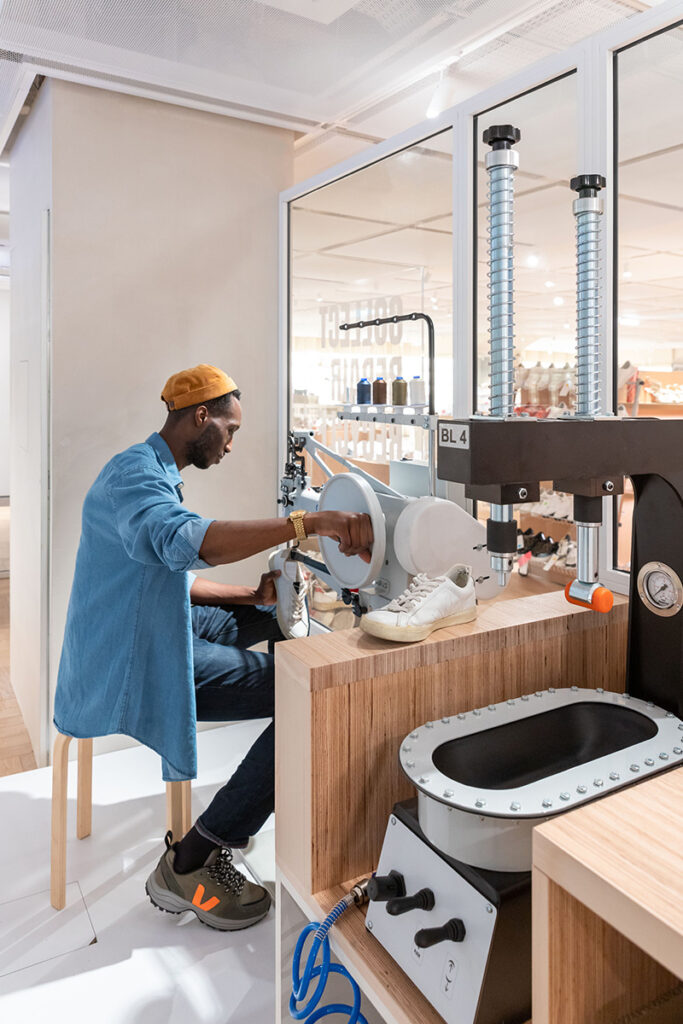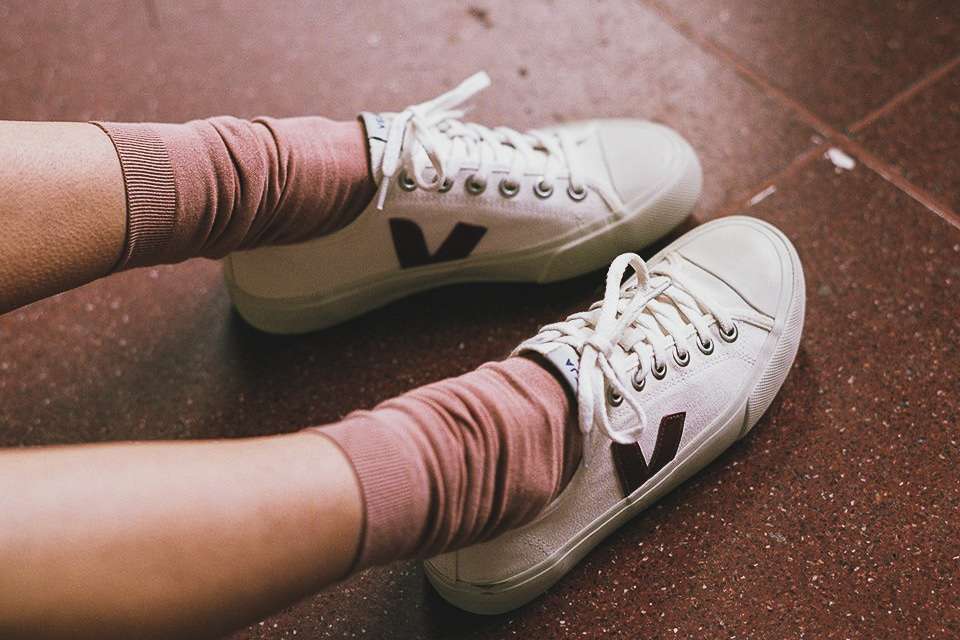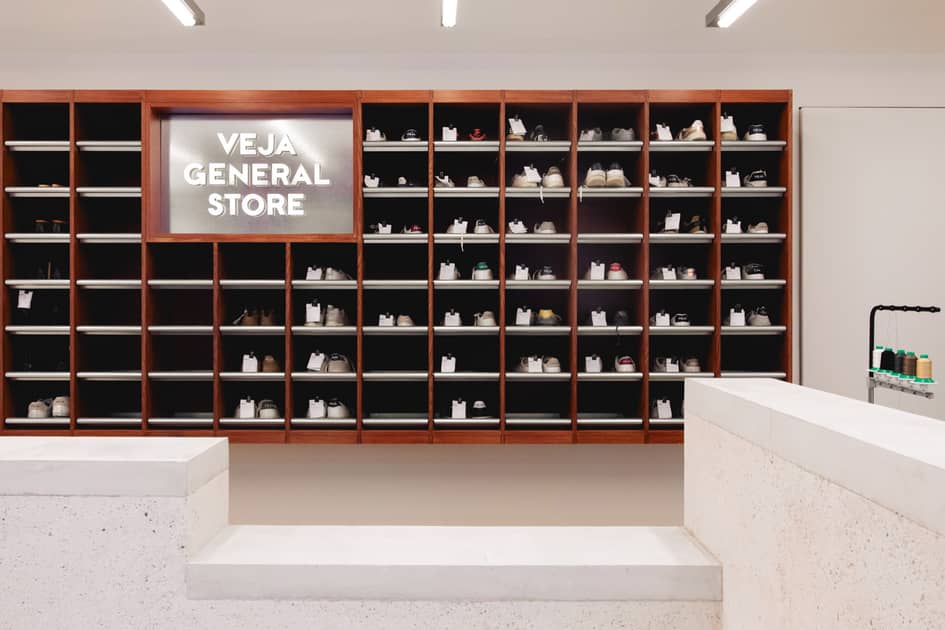With its celebrity stans and its longstanding supply chain and materials commitments, Veja is at the top of the sustainable footwear list. Can its recent dive into shoe repair shops move the responsible fashion needle even further?
Since its launch in 2004, French footwear label Veja set out to redefine the sneaker industry. So far, it’s worked; the label has set itself apart from the industry with a staunch commitment to sustainability, which includes shoes made from organic cotton, fair-trade rubber, and an increasing selection of recycled materials. Over the last two decades, Veja has sold more than 12 million pairs of sneakers, with placement in 70 countries. The label’s focus on every aspect of its production and post-consumer processes to ensure a lesser ecological footprint has taken it from a cult favorite to a celebrity essential. (The sneakers have been spotted on Meghan Markle, Emma Watson, and Reese Witherspoon, to name a few).
Veja recently expanded its sustainability commitment by opening a sneaker repair hub in Williamsburg, New York. The Brooklyn location joins a growing roster of Veja repair shops in Paris, Bordeaux, Berlin, and Madrid, which have refurbished 22,000 pairs of shoes — 10,000 of which were processed in just the last year, emphasizing the importance of repair and re-wear over disposal.
Veja’s repair hub
The Veja cobbler shops are part of a larger movement initiated by the brand to promote the longevity of all footwear, not just Veja shoes. Its goal is to reduce waste and encourage consumers to reconsider the disposable nature of fashion. The repair hubs do not limit their services to Veja products; they welcome any pair of worn-out shoes, offering services ranging from simple patch jobs to comprehensive renewals. This approach aligns with the company’s belief in the importance of “emotional durability,” which Veja sees as crucial to keeping products in use for longer periods.

Daniel Schmitt, Veja Project Manager, highlighted the challenges and successes of integrating these services into Veja’s business model. “With every workshop we’ve opened, the hardest part has been hiring,” he said as shoe repair (along with bag and clothing repair) has largely fallen out of fashion in recent decades as the churn of fast fashion motivates consumers to treat clothing and apparel as disposal, often single-wear items. So finding skilled workers is challenging. But that’s starting to change and not a moment too soon. Each year, Americans throw away approximately 300 million pairs of shoes, according to the U.S. Department of the Interior. These shoes often end up in landfills where they can take up to 40 years to decompose. The process emits a significant amount of carbon dioxide, a greenhouse gas that contributes to global warming. Moreover, many sneakers contain non-biodegradable materials that persist in the environment, polluting ecosystems and harming wildlife.
If they’re not trashed, many of these used shoes wind up in secondary markets, typically in African countries like Ghana, where resellers are overrun with cheap, unsaleable items that become a waste problem for unequipped municipalities. There’s even a name for the industry that translates to “dead white man’s clothes.” The country imports approximately 15 million items of unwanted clothing every week, reports The Guardian.
Sustainable shoe materials
And as problematic as the piles of apparel waste are, the production of new sneakers is equally as troublesome: new shoes (and clothing) require substantial natural resources including water and energy, and also involve toxic materials like synthetic rubber, plastic, and adhesives that release harmful chemicals into the environment during manufacturing as well as in decomposition.
Efforts to mitigate these impacts include recycling programs, innovations in eco-friendly materials, and increased consumer awareness leading to a rise in demand for sustainable products, but it’s a drop in the bucket compared to conventional production. Brands are increasingly exploring the use of recycled materials and designing sneakers for easier disassembly at the end of their life cycle, promoting a circular economy in the footwear industry. Celebrities are helping; just last month, rapper Nicki Minaj announced a collaboration with Løci, one of Veja’s competitors. The “Barbie World” singer dropped 11 sustainable styles with the label.

Veja’s innovative use of materials further demonstrates its commitment to sustainability. Prior to launching its first shoe, Veja’s co-founders Sébastien Kopp and François-Ghislain Morillion forged relationships in Brazil with organic cotton growers and wild rubber tappers to build a sustainable supply chain that benefits the planet and the people; the label is now paying nearly double the market price per kilo of cotton. Veja also prioritizes recycled materials like B-Mesh, a fabric made from recycled bottles. These materials significantly reduce the ecological footprint of their products by minimizing water use, preventing deforestation, and fostering a circular economy. Moreover, Veja ensures that its manufacturing processes are ethical and transparent. The brand maintains direct relationships with its suppliers, ensuring fair wages and safe working conditions for all workers in its supply chain. This ethical approach extends throughout Veja’s business practices, including its minimalistic approach to advertising, which redirects typical marketing funds toward enhancing product sustainability and worker compensation.
A transparent business model
Transparency is part of the backbone of Veja’s business model. It is open about its production processes, the materials used, and the conditions in its factories. This openness invites consumers to be a part of a movement where they are aware of the origins of the products they purchase and the impact of their consumption choices. Unlike many mainstream brands in the market, Veja adopts a subdued approach to advertising. It channels the funds typically earmarked for marketing toward enhancing the sustainability quotient of its products and ensuring fair wages in its supply chain.
Last year, Kopp told Footwear News about its reduce and reuse philosophy. “The psychology [behind sustainability] is not complicated,” Kopp said. “It’s a lot of common sense and courage, but what we do is not complicated. You just have to take risks and create some tension.”

It’s also leveraged collaborations to help bring awareness. Earlier this year, it partnered with Études on an updated version of the popular Fitz Roy shoe. With a colorway inspired by the Vercors Massif range in the Southeast of France, the hiking sneaker also features mountain-like detailing. That shoe was made from 100 percent recycled polyester that’s water resistant.
“We’re not quick,” Kopp said. “We have a relationship with speed and with pace that is ours. We prefer the facts. We prefer to act. We prefer the fieldwork more than advertisement.”
Kopp says he doesn’t think the footwear industry has changed much, but , rather the global conscience has changed when it comes to sustainability. “Some brands are making some progress,” he told Footwear News. “But when you ask very plain questions, like how much are the workers paid in these shoe factories, what are the components? The answers are still vague. The sneaker industry is very difficult to change. Because why change when it’s working?”
Related on Ethos:


